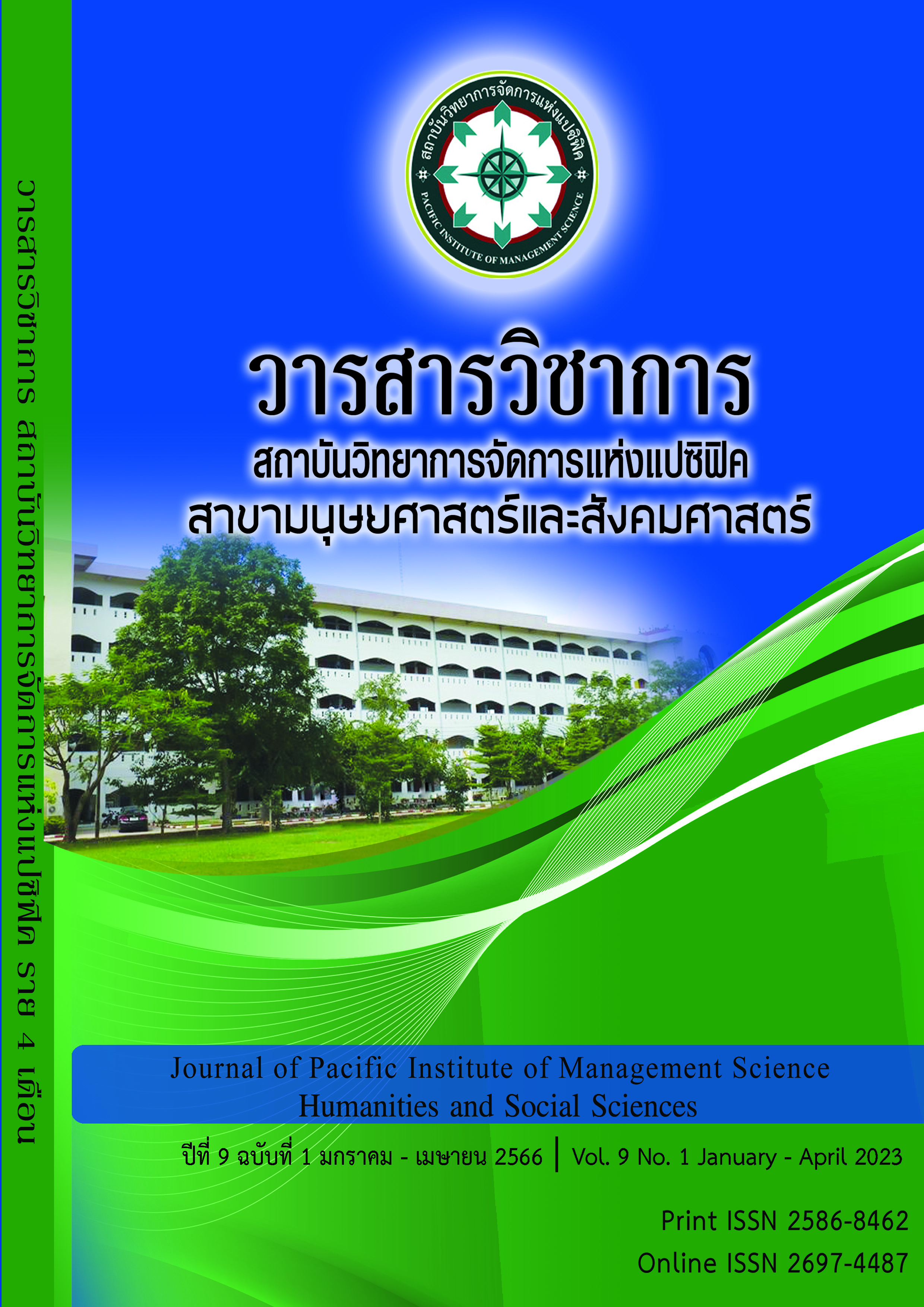Psychosocial factors and situational factors correlated with the Saving behavior of undergraduate students
Keywords:
Psychosocial, Saving behavior, Undergraduate studentsAbstract
This study is a comparative study using the interactionism model. It aims to identify significant indicators and predict the volume of psychological states and situational factors related to Saving behavior. The study’s sampling group is 807 undergraduate students, selected by multi-stage sampling. The study found that situational factors are positively and significantly to Saving behavior (r = 0.549, p<.01). The multiple regression analysis found that psychological traits, situations, and situational factors can predict the Saving behavior of the sampling group by 40.15 %; the best predicting factor are financial literacy and attitude towards spending behavior. The high-risk groups include undergraduate female students, low-grade undergraduate students, and young undergraduate students. The results of this research suggest guidelines for the development of saving behaviors.
References
Annual report Bank of Thailand. (2020). Retrieved from. https://www.bot.or.th/English /ResearchAndPublications/Report/DocLib_AnnualEconReport/AnnualReport2020_En.pdf
Bandura, A. (1989). Human agency in social cognitive theory. American Psychologist, 44(9), 1175–1184. Retrieved from https://doi.org/10.1037/0003-066X.44.9.1175
Bandura, A. (1993). Perceived self-efficacy in cognitive development and functioning. Educational Psychologist, 28(2), 117-148.
Bhanthumnavin, D. (2008). Importance of Supervisory Social Support and its Implication for HRD in Thailand. Psychology and Developing Societies. 12(2), 155-166.
Butbumrung, C. (2012). Income and savings patterns for preparing for old age of people between 30-40 years old in Dusit District, Bangkok. Suansunandha Rajabhat University.
Bhanthumnavin, D. (2013). Antecedents and consequences of mindful risk-taking behavior in secondary school students. Complete research report. National Research Council of Thailand, Research and Development of Thai Behavioral Systems.
Bhanthumnavin, D. (2015). Multi-dimensional test construction of readiness and potential to become researchers in different types of individuals. Research program multi-causal factor of readiness and potential to become researcher in university students and Thai scholars. Complete research report. National Institute of Development Administration, School of Social and Environmental Development.
Cohen, J. (1983). Applied Multiple Regression/Correlation Analysis for The Behavioral Sciences. New Jersey: Lawrence Erlbaum.
Judge, A., Locke, A., Durham, C., & Kluger, N. (1998). Dispositional effects on job and life satisfaction: The role of core evaluations. Journal of Applied Psychology, 83(1), 17–34. Retrieved from https://doi.org/10.1037/0021-9010.83.1.17
Klapper, T. (1960). The effects of mass communication. Free Press.
Khlaiprayong, V. (2015). Causal factors of psychopathology, situations, and norms-related perceptions and the attitude and acceptance of nuclear power plants of Thai undergraduate students. Journal of Business Administration. The Association of Private Higher Education Institutions of Thailand.
Kongtraipop, V., & Sakdapat, N. (2022). Causal factors of spending behavior by Thai undergraduate students: a path analytic approach. Journal of Demography, 38(2), 50–70. Retrieved from https://doi.org/10.14456/jod.2022.7
Kongtraipop, V., & Sakdapat, N. (2023). Psychosocial Factors Related to Purchasing Decision Behavior under the Influence of Key Opinion Leaders among Undergraduate Students. Warasan Phuettikammasat, 29(1), 121–139. Retrieved from https://so06.tci-thaijo.org/index.php/BSRI/article/view/259236.
Laokha, R. (2020). Personal financial planning of higher vocational certificate Bangkok technical of business administration vocational college. Ramkhamhaeng University.
Magnusson, D., & Endler, S. (1977). Personality at the crossroads: Current issues in interactionism psychology. New Jersey: LEA Publishers.
Muthen, K., & Muthen, O. (2007). Mplus User's Guide. (6th ed.). Los Angeles.
Namphut, S., & Charoenchittrakam, O. (2014). Personal finance management strategy. Faculty of Commerce and Accountancy. Thammasat University: Thammasat University.
Phengsuwan, P. (2009). Study of spending behavior of students in the Rajamangala University of Technology Srivijaya. Rajamangala University of Technology Srivijaya.
Panyasan, O. (2010). Third gender students' spending behavior Silpakorn University, Phetchaburi Campus. Silpakorn University.
Piromrat, D. (2012). Factors Affecting Purchasing Behavior of Bloom’s Mineral Makeup Cosmetics of Consumers in Bangkok Metropolitan Area. Srinakharinwirot University.
Potiratchatangkoon, S. (2015). Psychological and Situational Factors as correlates of Eating Concerned Behavior. National Institute of Development Administration, Social Development Administration.
Piamsiltham, P. (2017). Psychosocial factors and situations related to financial management behavior of government teachers Under the Bangkok Primary Education Service Area Office. Warasan Phuettikammasat, 23(1), 205–224.
Praneetvatakul, B. (2017). Psychosocial Correlates of Communicable Disease Preventive Behavior in Public Places for Undergraduate Students. Journal of Behavioral Science for Development, 10(1), 83–102.
Royal Institute. (2009). Royal Institute dictionary Thai year 2009. Retrieved from https://so05.tci-thaijo.org/index.php/spurhs/article/view/178915
Seritrakun, V. (2014). Factors Predicting Saving Behavior of Students in Bangkok Metropolitan Area. Suthiparita Journal.
Tangchitprattanar, G. (2019). Buying behavior based on critical thinking on interactionism model of undergraduate students. Veridian E-Journal. Silpakorn University.
Viyaritt, J. (2012). Psychosocial Factors and Social Norm Perceived Related to Responsibility Behavior of Rental-Car Drivers in Bangkok. Srinakharinwirot University.
Warawichanee, K. (2017). The following paper presents a detailed case study, regarding financial literacy and well-being of employees in financial institutions in Thailand. The case study will focus on selected group employees of Siam commercial bank. Bangkok University.
Downloads
Published
Issue
Section
License
Copyright (c) 2023 Pacific Institute of Management Science

This work is licensed under a Creative Commons Attribution-NonCommercial-NoDerivatives 4.0 International License.
บทความที่ได้รับการตีพิมพ์เป็นลิขสิทธิ์ของ สถาบันวิทยาการจัดการแห่งแปซิฟิค
ข้อความที่ปรากฏในบทความแต่ละเรื่องในวารสารวิชาการเล่มนี้เป็นความคิดเห็นส่วนตัวของผู้เขียนแต่ละท่านไม่เกี่ยวข้องกับสถาบันวิทยาการจัดการแห่งแปซิฟิค และคณาจารย์ท่านอื่นๆในสถาบันฯ แต่อย่างใด ความรับผิดชอบองค์ประกอบทั้งหมดของบทความแต่ละเรื่องเป็นของผู้เขียนแต่ละท่าน หากมีความผิดพลาดใดๆ ผู้เขียนแต่ละท่านจะรับผิดชอบบทความของตนเองแต่ผู้เดียว







